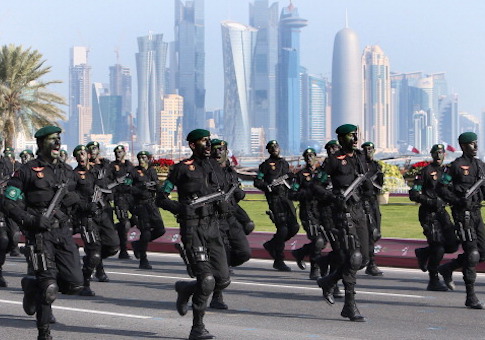The Israeli strike in Qatar on Tuesday sent a shockwave rippling far beyond the Middle East. Qatar’s neighbors and several European states rushed to condemn the bombing. Donald Trump was more conflicted, stating, “Unilaterally bombing inside Qatar, a Sovereign Nation and close Ally of the United States … does not advance Israel or America’s goals. However, eliminating Hamas, who have profited off the misery of those living in Gaza, is a worthy goal.” The United States ultimately signed off on the U.N. Security Council statement that “expressed their condemnation of the recent strikes in Doha” and “underscored that releasing the hostages, including those killed by Hamas, and ending the war and suffering in Gaza must remain our top priority.”
Observers have largely regarded the strikes, which targeted Hamas’s remaining top leaders, as part of the war Hamas and Iran started on Oct. 7. That is partly true, but it misses the bigger story: Israel’s victories against Iran and its proxies have broken Iran’s bid to dominate the Middle East. The region’s politics are recentering around the rivalry between coalitions led by Saudi Arabia and Turkey, and the Qatar strike will significantly affect this new arrangement.
Until this summer, Iran’s long-range missiles, menagerie of terrorists, and nuclear program made it the region’s ascending power. No longer. Israel has not totally defeated Iran, whose Palestinian and Houthi minions attack the Jewish state, but it has substantially degraded its missile arsenal and other means to project power. Iran’s remaining missiles pose a severe threat to the Gulf states and the American bases there, but it will take years to reconstitute the capabilities needed to bid for regional hegemony.
There are two remaining contenders: Saudi crown prince Mohammed bin Salman is leading his country and its allies to moderate socially and embrace emerging technologies like artificial intelligence. Recep Tayyip Erdoğan is turning Turkey back toward Islamism, and he wants to do the same across the region with help from Qatar and the Muslim Brotherhood.
Saudi Arabia is a bête noire for many Americans, but bin Salman’s agenda largely matches American interests. He slashed the radical Wahhabis’ overseas funding and curbed their influence over Saudi society. This is a key part of the “great transformation” Trump praised during his visit in May.
Many of the Gulf states want to align with the Saudis without becoming subservient. The United Arab Emirates is modernizing even faster than the Saudis and joined the Abraham Accords. Oman has positioned itself as a prime location for high-stakes diplomacy, and the Obama administration conducted its secret negotiations with Iran there. All of them want to stay close to the United States.
Qatar uses both strategies. It is a hub of international diplomacy, and it has given over $6 billion to American universities over the past four decades. Western businessmen and investors can live there with few problems, and Al Udeid Air Base is vital for the American military.
But there’s a dark side to its aspirations. Villains like Hamas and the Taliban live comfortably in Qatar. In the decade leading up to the World Cup it hosted in 2022, an estimated 6,500 South Asian laborers died there. Its TV channel, Al Jazeera, stirs up unrest in the region and spreads anti-American propaganda. At least one of its anchors celebrated the anniversary of Oct. 7, and several of its employees reportedly work for Hamas or Palestinian Islamic Jihad. Al Jazeera alumni permeate the American media.
The Muslim Brotherhood and its Palestinian branch, Hamas, are a core part of Qatar’s strategy. Turkey’s military is more capable than most Arab ones, but it is not wealthy and its Arab neighbors distrust it. Qatar, though, is Arab and has oil and gas money. Supporting the Muslim Brotherhood in countries like Egypt weakens the Saudi-led coalition; funding Hamas makes Qatar a leader in the anti-Israel world.
The relationship with the Muslim Brotherhood’s main enemy is another pillar of Doha’s plan. The Biden administration named Qatar a major non-NATO ally, which formalized a status Al Udeid gave it decades ago. Perversely, Americans who want to negotiate with Hamas and the Taliban prize Qatar’s ties to these adversaries.
Israel’s airstrike threatens to upset the Qatari strategy. Israel notified the U.S. military before launch. Defense Minister Israel Katz warned, “Israel’s long arm will act against its enemies anywhere,” which made Qatar’s safe haven much less desirable. Qatar still has money, and the other Gulf states must at least feign outrage at the bombing, but if it cannot protect its terrorist guests, it will lose an important source of influence.
Some of Hamas’s senior leaders seem to have survived this attack. Israeli ambassador to the United States Yechiel Leiter told Fox News, “If we didn’t get them this time, we’ll get them the next time.” Before that interview, Trump “assured [the Qataris] that such a thing will not happen again on their soil.” He also said, “I believe this unfortunate incident could serve as an opportunity for PEACE.” Hamas’s leaders should prove him right, or pack their bags.

















